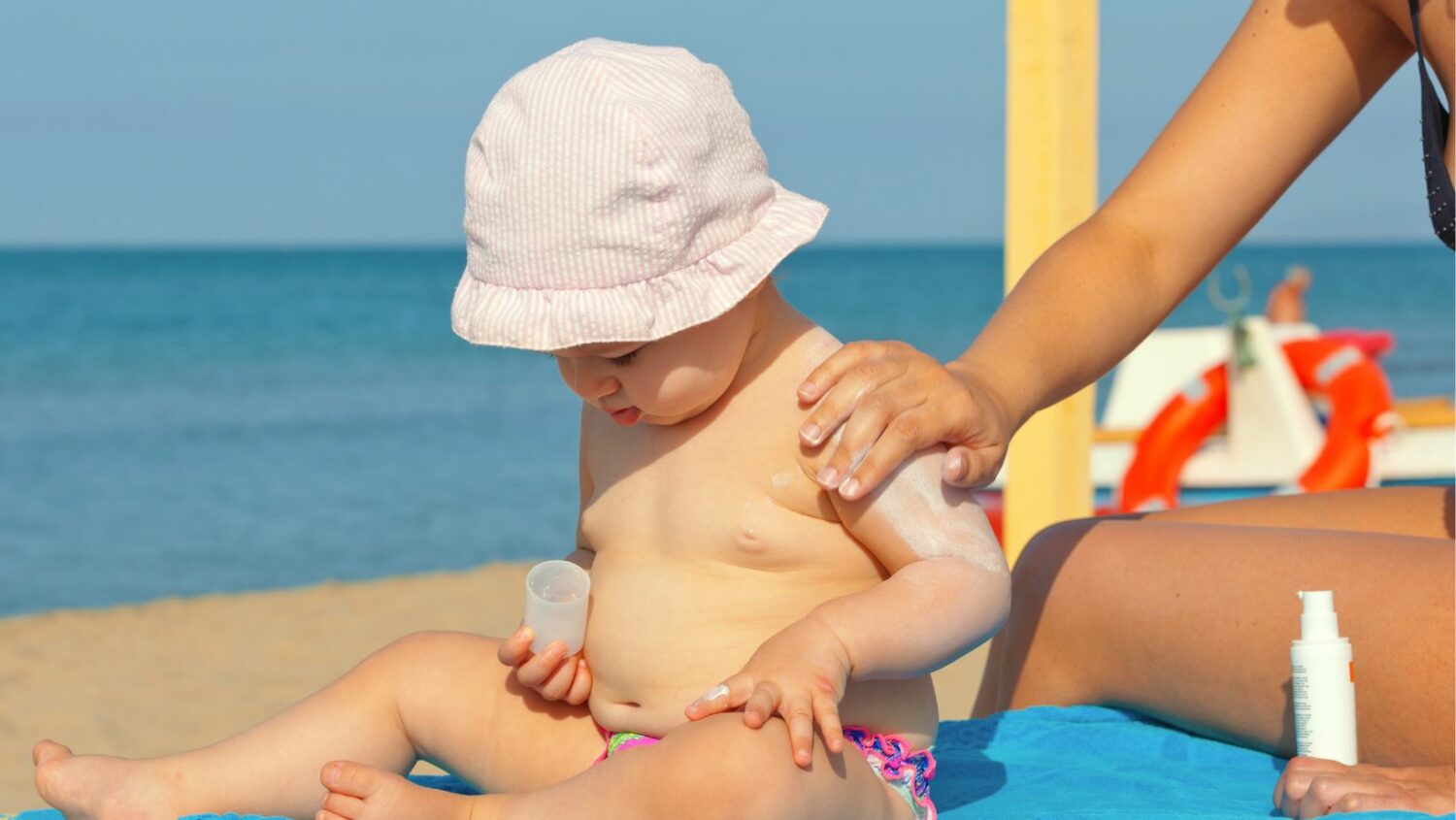As summer approaches, many parents are wondering how to protect their baby from the sun. Can sunscreen be applied to a young child? Which sunscreen should be choose? Should a baby wear sunglasses? These are just some of the questions that nag new parents, and with good reason!
For the general population, repeated exposure to ultraviolet UVA and UVB rays from the sun without protection can lead to skin cancer. Statistics are continually increasing based on the latest data from the Canadian Dermatology Association. The issue is disturbing and requires information campaigns and prevention starting from a very young age.
It is strongly recommended that everyone protect their exposed skin from the sun with broad-spectrum sunscreen, meaning a cream that will protect from both UVA and UVB rays. The sun protection factor (SPF) must be at least 30 depending on the type of skin, age and degree of exposure.
Zinc oxide-based barrier creams can also be recommended on a very young baby’s skin if it’s exposed to the sun for an extended period.
Protecting a young baby from the sun
 Babies have thinner, more fragile skin as their natural protection has not developed in their first months of life. Exposure to direct sun can lead to different skin reactions such as sunburn, urticaria, allergies, fever and dehydration. This can lead to more sensitive skin over the medium and long term, which can lead to problems in the future.
Babies have thinner, more fragile skin as their natural protection has not developed in their first months of life. Exposure to direct sun can lead to different skin reactions such as sunburn, urticaria, allergies, fever and dehydration. This can lead to more sensitive skin over the medium and long term, which can lead to problems in the future.
For children with pale skin or freckles or birthmarks : ATTENTION! These babies are at higher risk. Even babies with darker or black skin must be protected from the sun in the same way.
How can I protect my baby from the sun?
Here are a few tips to reduce the impact of the sun’s rays on your baby’s skin :
- The sun is generally strongest in the middle of the day. We therefore suggest to go outside before 11:00 and after 15:00.
- Choose shady spots or use the stroller’s sunshade. Covering the stroller or shell with a blanket is not recommended, as temperatures rise rapidly indoors.
- Choose a sunscreen with at least 30 SPF that protects against UVA and UVB rays.
- Cream sunscreens are preferable to spray-on sunscreens since their application is more optimal and there are no studies demonstrating the absence of risk associated with inhalation of spray-on sunscreens.
- Sunscreen should be applied about 20 to 30 minutes before going outdoors, and at least every 2 hours thereafter (or more, depending on the activity).
- Sunscreen can be applied to children under 6 months of age, on parts of the body that could be exposed to the sun.
- For young children, mineral sunscreen is preferable to chemical sunscreen. Mineral sunscreen, generally made from zinc oxide, reflects the sun’s rays.
- Wear light, long clothing and a wide-brimmed hat. If possible, use clothing that offers protection against UV rays.
- Sunglasses are recommended. They should be marked UV400 or 100% UV protection.
- Choose light-colored fabrics made from materials such as cotton, linen or bamboo.
UV Index Protection Scale
The UV Index Protection Scale helps you understand what your baby needs.
UV Index 1 and 2
Minimal sun protection required:
- Normal activities
- Sunglasses for the baby if sunny
- Cover exposed skin
UV Index 3-5
Increased protection starting at UV Index 3:
- Sunscreen
- Stay in the shade
- Avoid peak sun times between 11 am and 2 pm
- Hat and sunglasses for the baby
- Sunscreen on exposed skin even before six months of age, repeat as needed. You can also use barrier creams.
UV Index 6 and 7
Necessary protection:
- Avoid going out between 10 am and 4 pm
- Stay in the shade, hat, sunglasses, ample light clothing, cover legs and feet
- High risk of sunburn
- A sunscreen based on age and skin type
UV Index 8-10
Increased protection because of a very high risk of quick sunburns:
- Same suggestions as 6 and 7 while avoiding sun exposure as much as possible
UV Index 11+
- Skin can burn in a couple of minutes


